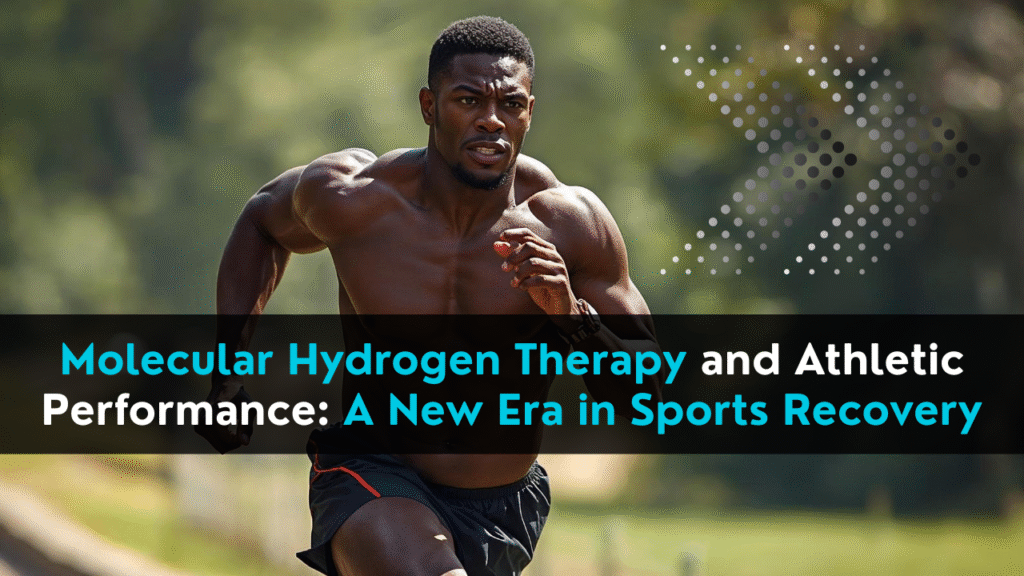High-performance sports push the human body beyond its natural limits. Athletes and fitness enthusiasts are constantly searching for safe and effective methods to improve endurance, accelerate recovery, and prevent injuries. In this context, molecular hydrogen therapy (H₂) has emerged as a promising innovation with growing scientific support.
What Is Molecular Hydrogen?
Molecular hydrogen is the smallest and lightest molecule in the universe. Because of its size, it can easily cross cell membranes, the blood–brain barrier, and reach the mitochondria—the cell’s energy centers. Research has shown that H₂ acts as a selective antioxidant and regulator of oxidative stress, two critical processes that directly impact sports performance and recovery.
Key Benefits for Athletes and Active Individuals
1. Reduces Oxidative Stress
Intense training generates high levels of free radicals, which damage muscles and joints. Hydrogen selectively neutralizes the most harmful radicals while leaving essential signaling pathways intact, promoting faster tissue repair.
2. Decreases Muscle Fatigue
Studies indicate that H₂ can reduce the accumulation of lactic acid, a key factor responsible for the burning sensation and fatigue after strenuous exercise.
3. Accelerates Recovery
Athletes using hydrogen inhalation or hydrogen-rich water often report reduced inflammation and muscle soreness, allowing them to train more frequently and at higher intensity.
4. Supports Joint and Inflammatory Health
Sports involving high impact often wear down joints and tendons. Hydrogen helps modulate the inflammatory response, providing joint protection and reducing the risk of overuse injuries.
5. Enhances Cognitive and Mental Performance
Sports are not only physical but also mental. Hydrogen penetrates the brain, supporting mental clarity, focus, and reducing psychological fatigue during training and competition.
Practical Applications in Sports
- Hydrogen inhalation therapy: Using specialized devices such as the Super Power 1500 ml or Immortal 3000 ml, ideal for post-training sessions.
- Hydrogen-rich water: A daily hydration strategy that supports antioxidant capacity and cellular health.
- Synergy with nutrition and supplements: Enhances the action of antioxidants like vitamin C, CoQ10, and omega-3 fatty acids.
Conclusion
Molecular hydrogen therapy is not just a wellness trend—it’s a science-based approach that may redefine athletic recovery and performance. For athletes and active individuals, it represents a safe and innovative way to recover faster, train harder, and protect their bodies long-term.
The future of sports performance goes beyond equipment and training routines: today, cellular health through molecular hydrogen opens a new chapter in human potential.
- Zhou, Q. et al. Hydrogen-Rich Water to Enhance Exercise Performance: A Review of Effects and Mechanisms.
This review compiles studies on how hydrogen-rich water (HRW) affects endurance, strength, jump performance, time to exhaustion, and explores molecular mechanisms (e.g. redox regulation). PMC+2PubMed+2 - Li, Y. et al. Can Molecular Hydrogen Supplementation Reduce Exercise-Induced Oxidative Stress? (Frontiers in Nutrition, 2024)
A systematic review & meta-analysis showing that while H₂ supplementation did not significantly reduce markers of oxidative stress (d-ROMs), it did increase antioxidant potential (BAP) in healthy adults, especially in intermittent exercise. Frontiers - Zhou, K. et al. Effects of 8 Days Intake of Hydrogen-Rich Water on Muscular Endurance in Trained Individuals (Frontiers in Physiology, 2024)
Double-blind crossover RCT: 8 days of intermittent HRW significantly improved muscular endurance (more power output, more repetitions) vs placebo. Frontiers - Sládečková, B. et al. Hydrogen-Rich Water Supplementation Promotes Muscle Performance, Damage, and Perception of Soreness (Frontiers in Physiology, 2024)
Study in elite swimmers assessing muscle performance, damage indicators (creatine kinase), and soreness perception after strenuous sessions, comparing HRW vs placebo. Frontiers - Sundararajan, P. et al. A Systematic Literature Review of the Effects of Molecular Hydrogen in Sports / Exercise Contexts
A review covering many smaller studies (2012–2022) on HRW in athletes, discussing anti-fatigue effects, inflammation modulation, and limitations. internationalfootankle.org+1 - Boretti, A. et al. Therapeutic Potential of Hydrogen in Sports Orthopaedics (2024)
A paper exploring how hydrogen might help in sports-related injuries, oxidative stress, recovery, and joint health. ScienceDirect - Nogueira, J. E. et al. Molecular Hydrogen Reduces Acute Exercise-Induced Inflammation and Oxidative Stress (2018)
A study providing evidence that H₂ can reduce inflammation and oxidative damage after acute strenuous exercise. ScienceDirect - Botek, M. et al. Hydrogen-Rich Water Supplementation and Up-Hill Running Performance (International Journal of Sports Physiology and Performance, 2019/2020)
Study showing that pre-exercise HRW improved lactate, ventilatory, perceptual responses and other performance metrics. journals.humankinetics.com - Dhillon, G. et al. “Hydrogen Water: Extra Healthy or a Hoax? — A Systematic Review” (MDPI, 2024)
A review that critically examines claims around hydrogen water, noting encouraging findings but also inconsistencies and limitations in evidence. mdpi.com

